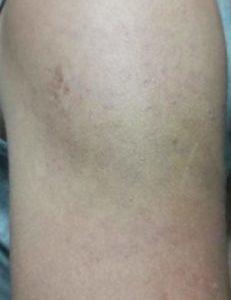A group of 30 people on the move from Afghanistan, aged between 16 and 25 years old, attempted to cross the Romanian border on the 21st of January. The respondents described having started walking from the Serbian city Vršac until they crossed the Romanian border around 6-7 pm.
They had reached the Romanian side only some minutes before they saw something that they described as a flash of a camera. The respondents recalled being in a muddy path when the group suspected being detected by the camera. They then sat in a field and waited, trying to avoid apprehension by Romanian authorities.
After some minutes they began walking again for an unspecified amount of time. It was approximately 9.00PM when seven male officers wearing black uniforms, referred to by the respondents as Romanian police, apprehended the group. According to the respondents, they were close to a road (Road 57) when some officers came up from the other side of the field and stopped the group. The respondents stressed that they could not see the authorities arriving; thus they did not even try to escape. Reportedly, the group was not able to see any police vehicle coming, because they were in a field from where the group could not see the road properly (approximate location: 45.258290,21.286065). According to the respondents’ understanding of the apprehension dynamics, the police officers arrived because they had previously detected them with the camera.
The respondent reported how, firstly the group was ordered to sit on the ground with their hands on their heads, while the authorities were asking insistently to show which member of the transit group had led them to the spot. Then, the respondents described being forced to stand up to hand over their mobiles. In fact, all members were searched for mobiles and telephones. Subsequently, the mobiles were broken in different ways: the respondents recalled that some mobiles were destroyed with batons, while others were buried under the ground. The respondents wished to highlight that one officer watched all of one family’s pictures and videos collected in a member’s phone and immediately after he broke the mobile.
The respondent reported that the officers only beat three members of the transit group. They could not understand why these three were chosen but assumed it was because they did not have mobile phones to give over to the authorities.
“He (one Romanian officer) told me to give him my mobile, but I didn’t have mobile with me, so he beat me for 2-3 minutes”
The respondents complained of feeling pain on his back, on his shoulder, and on his arms, where he mentioned having still some bruises. The respondent reported that the beating felt to him like it went on for a long time.

(Bruise on the respondent’s arm after been pushed back from Romania. He took this picture some days later, but he complained of still feeling some pain in his arm.)
The respondents stated that they expressed their intention to apply for asylum in Romania, but stressed they had received a refusal by the authorities as an answer. The police officers were described saying :
“No asylum, go, go. (…) Go to Germany, France, Italy. Romania no. (…)”
Moreover, the respondents pointed out that, at some point, the officers told them something in the line of:
“I’ll not tell you one more time, if you will come again to Romania next time you will all die.”
The respondent described that the group was held for roughly half an hour at the point of apprehension. Then, the respondents described having been ordered to follow the authorities, walking for approximately 30 minutes. They arrived around 10:00 pm somewhere close to the Serbian border (approximate location: 45.243632,21.294131) and they were subsequently ordered to walk in the direction of Serbia.
Afterward, the respondents searched for the nearest bus station (close to the Serbian city Vršac). They reached Belgrade on the morning of the 22nd of January.
